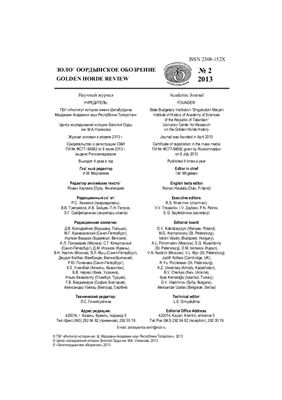Пилипчук Я.В. Хан Джанибек и князь Любартас-Дмитрий//
Золотоордынское обозрение. Вып.
2. Казань, 2013. С. 73-100.
This study focuses on relations of Volhynia princedom during the reign of Lyubartas-Dmitriy and Jochi Ulus during the reign Janibek-khan. Lubartas-Dmitry reigned in Easte Volhynia largely due to the will of Uzbek-khan. Brest land with Easte Volhynia were portion of Lubart in Volyn. As Boleslaw-Yuri II, Lyubartas-Dmitriy was forced to pay tribute to the tatars. During the War of Galicia-Volyn legacy, Lyubartas acted as a vassal of the Ulus of Jochi and ally of Uzbek khan. Relationship of Lyubartas-Dmitriy with Janibek-khan were radically different from relations with the Uzbek-khan. Casimir III was sympathized by Golden Horde khan, who won that sympathy with a tribute. Exception was the campaign 1351-1352 years Janibek-khan was hostile to Lithuania. Only the general hostility of the Poles and Hungarians towards the Volhynia and Podolia forced khan of Jochi Ulus to intervene on the side of the Lithuanians. For Janibek weste vector of foreign policy was not a priority. He could stand to lose a tribute from several Slavic principalities in exchange for progress on the more profitable in terms of production fronts. Volynian Gediminoviches were most peacefully disposed towards the Tatars, because unlike Koriatoviches and Olelkoviches their possessions during the ’’Great Disorder’’ were not increased by holdings of Jochi Ulus.
2. Казань, 2013. С. 73-100.
This study focuses on relations of Volhynia princedom during the reign of Lyubartas-Dmitriy and Jochi Ulus during the reign Janibek-khan. Lubartas-Dmitry reigned in Easte Volhynia largely due to the will of Uzbek-khan. Brest land with Easte Volhynia were portion of Lubart in Volyn. As Boleslaw-Yuri II, Lyubartas-Dmitriy was forced to pay tribute to the tatars. During the War of Galicia-Volyn legacy, Lyubartas acted as a vassal of the Ulus of Jochi and ally of Uzbek khan. Relationship of Lyubartas-Dmitriy with Janibek-khan were radically different from relations with the Uzbek-khan. Casimir III was sympathized by Golden Horde khan, who won that sympathy with a tribute. Exception was the campaign 1351-1352 years Janibek-khan was hostile to Lithuania. Only the general hostility of the Poles and Hungarians towards the Volhynia and Podolia forced khan of Jochi Ulus to intervene on the side of the Lithuanians. For Janibek weste vector of foreign policy was not a priority. He could stand to lose a tribute from several Slavic principalities in exchange for progress on the more profitable in terms of production fronts. Volynian Gediminoviches were most peacefully disposed towards the Tatars, because unlike Koriatoviches and Olelkoviches their possessions during the ’’Great Disorder’’ were not increased by holdings of Jochi Ulus.

